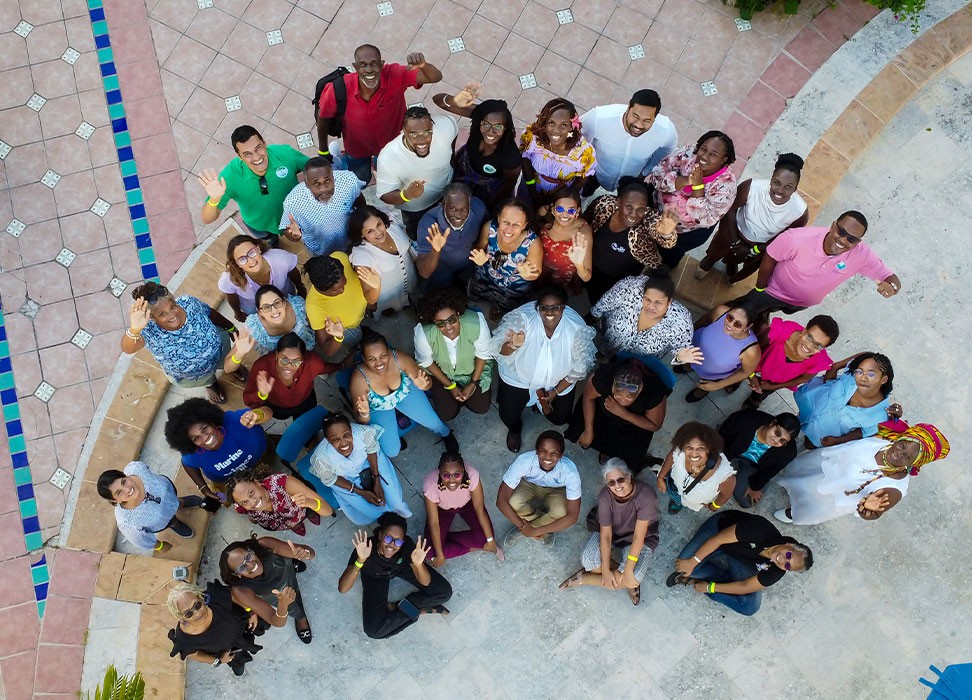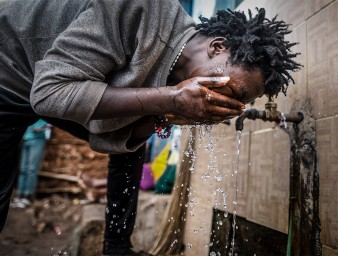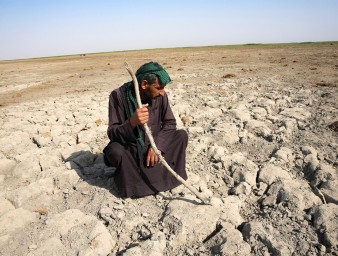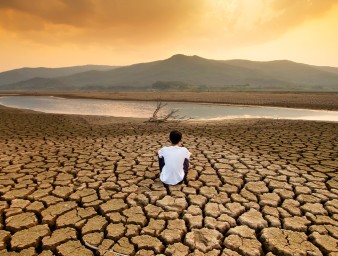“Small islands bear a climate crisis they did not create”
18 June 2024

“I am a biologist and taking a human rights and justice approach is a new area for me. But even though we aren't using this language, it is the work we're doing,” said Nicole Leotaud, Executive Director of the Caribbean Natural Resources Institute (CANARI). “You can’t help but look at equity, justice, and human rights issues when you are working with stakeholders on the ground, with vulnerable and marginalized people, and hearing their stories and seeing their challenges.”
Leotaud attended the 4th International Conference on Small Island Developing States (SIDS4) that took place in Antigua and Barbuda last May, with the overreaching theme of “Charting Course Toward Resilient Prosperity.” The Conference aimed at assessing the ability of SIDS to achieve sustainable development, including the 2030 Agenda, and was attended by government officials, civil society, experts, and several UN agencies, including UN Human Rights.
CANARI is an organization that promotes and facilitates stakeholder participation and collaboration in the stewardship of renewable natural resources critical to development in the Caribbean islands.
“Healthy biodiversity and ecosystems are critical for life. Our work is about supporting people's involvement in decisions about how these natural resources are used sustainably, are conserved, are protected, are restored,” Leotaud said. “In the Caribbean, we feel a real connection culturally to nature.”
UN Human Rights Chief Volker Türk has highlighted on many occasions that human rights offer a roadmap for the transformative change that’s needed to make peace with nature, preserving the planet and the future of humanity.
“The human rights framework is universal. It compels us to act. Not out of fear, but out of a commitment to solutions – rooted in justice and human dignity. Solutions that will actually work,” Türk said while addressing National Human Rights Institutions at a conference last year.
UN Human Rights promotes a human rights-based approach to climate action and to resilience building in societies, collaborating with a broad range of partners to integrate human rights into environmental laws and policies. The Office also supports the participation of civil society and affected persons in environmental discussions and decision-making, advocating for effective access to information and remedies, and providing support to human rights defenders in environmental matters.
“We must build on the remarkable progress on the right to a clean, healthy and sustainable environment: through furthering its recognition in national, regional and international legal frameworks; the ratification of existing human rights and environmental instruments along with consideration of new ones; and the introduction of effective mechanisms and policies to operationalize this right,” said Türk in his vision statement, “Human Rights: A Path for Solutions.”
Progress on the right to a clean, healthy and sustainable environment can be seen through the Escazú Agreement, the first regional environmental human rights treaty in Latin America and the Caribbean. A ground-breaking pact that recognizes the right to a healthy environment, to secure public participation, access to information, and access to justice and enhanced protection for environmental human rights defenders. The Escazú Agreement became a reality in April 2021 and has been ratified by 16 out of 25 countries, including eight Small Islands Developing States in the Caribbean: Antigua and Barbuda, Belize, Dominica, Grenada, Guyana, St. Kitts and Nevis, St. Lucia, and St. Vincent and the Grenadines.
Leotaud is one of six representatives who was elected through a process open to the public to promote, support and facilitate the public’s engagement to the Escazú Agreement.
“We have been really focusing on getting Caribbean civil society and frontline communities on the ground involved in understanding what the Agreement is about, understanding these rights and how they can use this Agreement to support their work and address the issues they face,” Leotaud said.
The Agreement highlights the importance of environmental defenders, which is important because many people in the Caribbean feel that this region doesn’t have issues with environmental human rights defenders, however, work on the ground tells a different story, Leotaud added.
“We need first recognition of the realities on the ground, the work these environmental defenders are doing, the issues they're facing and then how can we have solidarity to support them,” Leotaud said.
“During the Conference, there was ample recognition that SIDS are in the crossfire of multiple crises, including water and food insecurity, sea-level rising, droughts, with climate and environmental action and finance becoming increasingly urgent. Climate-related disasters have doubled in two decades,” said Juana Sotomayor, Human Rights Adviser for the UN Resident Coordinator Office for Barbados and Eastern Caribbean.
“The United Nations is committed to supporting islands in their quest for a more resilient and sustainable future,” said Li Junhua, UN Under-Secretary General for Economic and Social Affairs. “They may be geographically remote, but their problems are not theirs to face alone.”
Climate action must be for all
“Our efforts must prioritize the needs of the most vulnerable among us. Women, youth, Indigenous and Afro-descendant Peoples, and other marginalized communities must be at the center of our climate strategies,” said Molwyn Joseph, Antigua and Barbuda’s Minister of Health, Wellness, Social Transformation, and the Environment during his opening remarks at a side event organised by CANARI and UN Human Rights during SIDS4.
“According to the United Nations, women and children are 14 times more likely than men to die during a disaster,” Joseph said.
“
It is a fundamental human right to live in a healthy and safe environment, and our policies must reflect this commitment to social inclusion.
“
Sir Molwyn Joseph, Antigua and Barbuda’s Minister of Health, Wellness, Social Transformation, and the Environment
Joseph thanked CANARI and UN Human Rights for bringing authorities, civil society and the UN together at this side event in SIDS4, as they strive to adopt a “whole of society” approach to addressing the climate crisis.
For Leotaud, climate action is not only about communities who are suffering direct impacts of climate change.
“It’s about the added vulnerabilities and injustices [people] are facing. You know, whether it's race, whether it's poverty, as the legacy of colonialism in the Caribbean is very real. Whether it's gender, whether it's LGBTQ+ issues, persons with disabilities,” she said.
Civil society organisations in the Caribbean issued a series of recommendations leading up to the SIDS4 conference one of which is for human rights and access to justice to be considered as central to development.
“There was a very strong call from civil society for the recognition of the right to a safe and healthy environment and also an intersectional approach that brings all the human rights issues together so that we have a much more sophisticated understanding of the problems, the needs and the solutions,” Leotaud said.
“Small Islands bear a climate crisis they did not create and cannot address alone,” Türk said. We must ensure rights-based climate financing and the Antigua and Barbuda Agenda for SIDS (ABAS) commitments are delivered and the right to a healthy environment is protected for all.”



